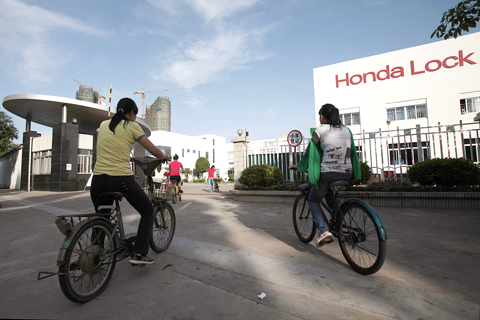Toyota Motor Corp stopped production at its main factory in China after a strike at its plastic parts supplier, the carmaker said yesterday, the latest in a series of labor disputes across the country.
Toyota said its factory at Tianjin, near Beijing, stopped production midway through the day on Friday.
Company spokeswoman Ririko Takeuchi said the Tianjin Toyota plant, with three assembly lines and a combined annual production capacity of 420,000 vehicles, was closed for the weekend and plans for resuming production tomorrow depended on securing steady supplies from strike-hit parts maker Toyoda Gosei.

PHOTO: REUTERS
Two walkouts have hit the parts supplier for Toyota. Workers at the Toyoda Gosei plant, also in Tianjin, said late on Friday the strike disrupting supply lines was still on.
However, workers at a Honda auto parts plant in southern China showed up for work yesterday apparently ready to accept a new pay deal to resolve a week-long strike.
The new Honda deal was emerging after days of difficult talks between worker representatives and management. It failed to yield any further raising of base salary levels from a 200-yuan (US$29) wage hike already offered and rejected by striking workers last weekend.
Despite the apparent setback, many workers at the Honda Lock plant in the Pearl River Delta town of Zhongshan appeared ready to accept the terms and put the strikes behind them.
“We’re tired of all this tension,” said one young factory girl who was among hundreds streaming to work at the Honda plant. “We just want to go back to work and see what happens.”
While Honda Lock has not yet confirmed the fresh offer, one worker source said that worker representatives negotiating on their behalf had accepted this “final deal.”
Notices of the new deal were posted up inside the factory, workers said, announcing a 200-yuan rise in base salary levels and an 80-yuan rise in housing benefits.
A Honda Motor spokeswoman said yesterday a strike hit a factory affiliate Nihon Plast Co in Zhongshan on Thursday and supply was temporarily disrupted.
Honda said production at the factory, which makes plastic parts such as steering wheels, had resumed on Friday but that negotiations between workers and management were still going on. Car production was not impacted.
The Nihon Plast factory also supplies steering wheels and airbags to Nissan Motor Co but a spokesman at Nissan said there had been no impact on its car production.
China’s commerce minister shrugged off concerns that recent labor unrest in the so-called “workshop of the world” will scare investors away, state media reported yesterday.
“A small proportion of the contracts may be transferred to countries with lower costs but China has yet to lose its labor cost advantage,” Chinese Minister of Commerce Chen Deming (陳德銘) was quoted as saying by the official China Daily newspaper.
Chen told Hong Kong-based Phoenix TV that the recent strikes were “isolated cases.”
“We want to ensure workers get an appropriate wage increase but also want to pay attention to the capacity of enterprises to bear the burden [of rising personnel costs].”

HANDOVER POLICY: Approving the probe means that the new US administration of Donald Trump is likely to have the option to impose trade restrictions on China US President Joe Biden’s administration is set to initiate a trade investigation into Chinese semiconductors in the coming days as part of a push to reduce reliance on a technology that US officials believe poses national security risks. The probe could result in tariffs or other measures to restrict imports on older-model semiconductors and the products containing them, including medical devices, vehicles, smartphones and weaponry, people familiar with the matter said. The investigation examining so-called foundational chips could take months to conclude, meaning that any reaction to the findings would be left to the discretion of US president-elect Donald Trump’s incoming team. Biden

INVESTMENT: Jun Seki, chief strategy officer for Hon Hai’s EV arm, and his team are currently in talks in France with Renault, Nissan’s 36 percent shareholder Hon Hai Precision Industry Co (鴻海精密), the iPhone maker known as Foxconn Technology Group (富士康科技集團) internationally, is in talks with Nissan Motor Co’s biggest shareholder Renault SA about its willingness to sell its shares in the Japanese automaker, the Central News Agency (CNA) said, citing people it did not identify. Nissan and fellow Japanese automaker, Honda Motor Co, are exploring a merger that would create a rival to Toyota Motor Corp in Japan and better position the combined company to face competitive challenges around the world, people familiar with the matter said on Wednesday. However, one potential spanner in the works is

SEMICONDUCTORS: Samsung and Texas Instruments would receive US$4.75 billion and US$1.6 billion respectively to build one chip factory in Utah and two in Texas Samsung Electronics Co and Texas Instruments Inc completed final agreements to get billions of US dollars of government support for new semiconductor plants in the US, cementing a major piece of US President Joe Biden administration’s CHIPS and Science Act initiative. Under binding agreements unveiled Friday, Samsung would get as much as US$4.75 billion in funding, while Texas Instruments stands to receive US$1.6 billion — money that would help them build facilities in Texas and Utah. The final deals mean the chipmakers can begin collecting the funding when their projects hit certain benchmarks. Though the terms of Texas Instruments’ final agreement is

Call it an antidote to fast fashion: Japanese jeans hand-dyed with natural indigo and weaved on a clackety vintage loom, then sold at a premium to global denim connoisseurs. Unlike their mass-produced cousins, the tough garments crafted at the small Momotaro Jeans factory in southwest Japan are designed to be worn for decades, and come with a lifetime repair warranty. On site, Yoshiharu Okamoto gently dips cotton strings into a tub of deep blue liquid, which stains his hands and nails as he repeats the process. The cotton is imported from Zimbabwe, but the natural indigo they use is harvested in Japan —